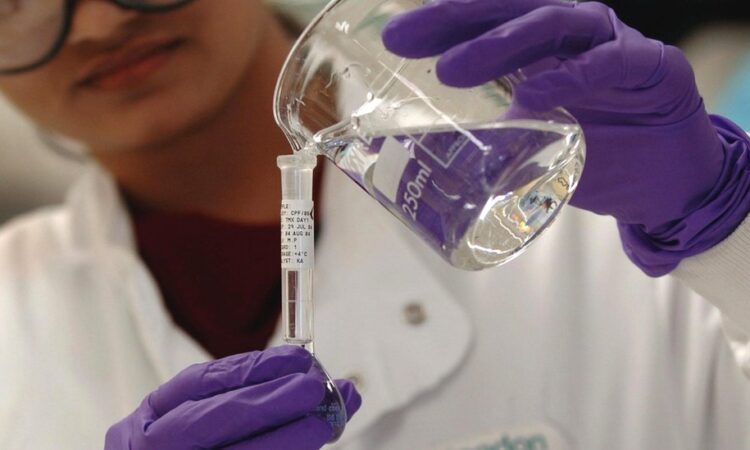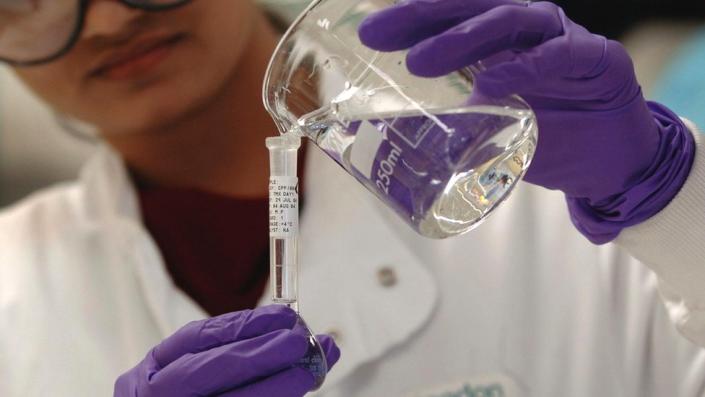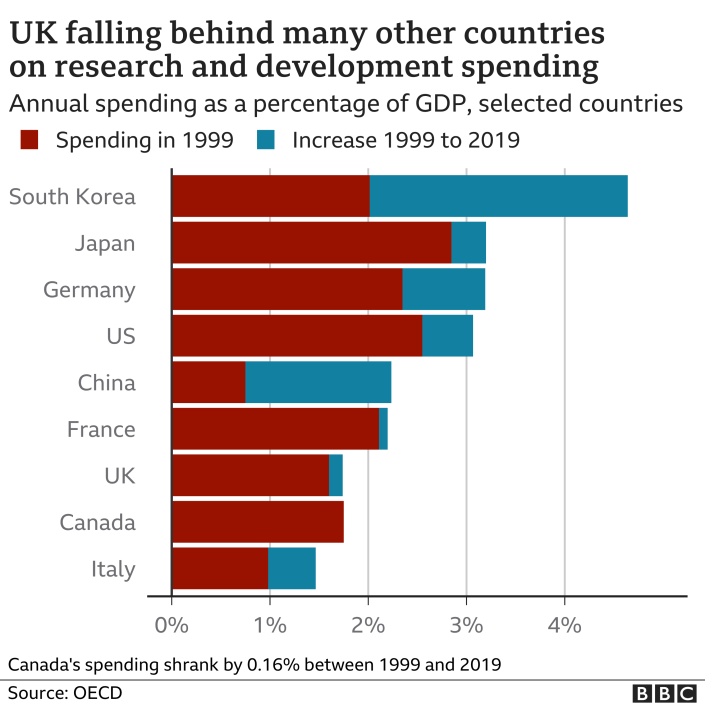

Leading scientists and businesses have said that cuts to the government’s research risks “stalling” efforts to make the UK a science superpower.
The stark message was delivered ahead of the Autumn Statement next Thursday.
There is concern that proposed increases to boost the UK economy will now be cut back.
Among those expressing concern are leading pharmaceutical companies, The Royal Society and the Academy of Medical Sciences.
The government does not comment on spending plans ahead of the Autumn statement.
Prof Sir Adrian Smith, who is head of the Royal Society, which represents the UK’s leading scientists, is among those who in a joint statement with other senior researchers and business leaders have called on the chancellor to use the Autumn statement on 17 November to recommit to a long-term plan to support what he describes as “one of the UK’s greatest strengths”.
“I think it’s important, given the government’s growth agenda, that our industry colleagues have joined together with scientific colleagues to stress the vital importance of R&D investment, not just for beauty, truth and goodness in science, but as a fundamentally important ingredient in ensuring prosperity for the future of the UK,” he told BBC News.

Among the signatories are: Lord Anthony Bamford, Chair of the construction equipment manufacturers JCB; Dame Kate Bingham, former Chair of the UK Government Vaccine Taskforce; Demis Hassabis, Founder & CEO of the AI company DeepMind; and Dame Sue Ion FRS, chair of the UK Nuclear Innovation Research Advisory Board.
Back in 2020, when he was chancellor, Rishi Sunak had pledged to increase the research budget from just under £15bn per year to £20bn by 2025. The investment was part of the government’s industrial strategy to create new and hi-tech jobs to boost the economy.
The increase is due to be spent on a wide range of research areas, many of which have benefits to society. These include the development of more effective medicines, new ways to combat climate change and improvements in food production.
The heads of many scientific organisations and research-based companies now fear the increase could be drastically cut back as Mr Sunak and Chancellor Jeremy Hunt aim to find savings in the Autumn statement.
Especially at risk is the £5.5bn allocated to UK membership of the European Union’s Horizon research programme, which is currently in limbo because of a row over the Northern Ireland protocol, according to Prof Sarah Main of the Campaign for Science and Engineering.
“If the future of our membership of the Horizon programme is left at an impasse, there is a vulnerability for the money set aside for the programme. If it can’t be resolved. then we want to see the money invested in R&D projects.”

The expectation in 2020 was that if the UK was unable to resolve differences with the EU over membership, that money could be kept and used to fund a UK alternative to the Horizon programme, known as “Plan B”. But there are worries that may now not happen and that the funds will be diverted away from front line research, while still technically remaining under the science budget to avoid the appearance of a cut.
Prof Dame Anne Johnson, President of the Academy of Medical Sciences, told BBC News that the recent Covid-19 pandemic showed why international collaboration was essential.
“We are not out of the woods here,” she said. “There’s a lot of stuff coming down the line, further pandemics. We have seen some decline in our health in the UK, there are some worries about cancer, mental health and so on.
“We are calling on government to make sure that the money they have committed to Horizon Europe is used in biomedical and health research in the event that we are not able to be associated with Horizon Europe.”
There’s also concern that £10.7bn for research by government departments could also be cut.
“Investment in the future”
Prof James Wilsdon, of the Research on Research Institute at Sheffield University said that although plundering Horizon Europe and government department funds would be easier than more contentious areas of spending, in relative terms it wouldn’t raise that much money and would be short-sighted.
“Rushi Sunak’s increase in science spending in 2020 was an investment in the future of the British economy. And in 2022, there is now a market confidence dimension to it.
“The current Prime Minister would not be in post were it not for a loss of confidence by the international financial markets in the coherence of the British government’s strategy in the management of our economy and I think in that context demonstrating that you have a serious programme of investment in R&D is part of re-establishing and maintaining credibility that you have a plan that gets to longer-term growth.”
Among those who signed the statements made by the Academy of Medical Sciences are Wellcome, the Association of the British Pharmaceutical Industry, Pfizer, Life Arc, the Association of Medical Research Charities, the Institute of Cancer Research, the UK Dementia Research Institute, the British Heart Foundation, the British Heart Foundation, The institute of Cancer Research, The Bioindustries Association, the Institute of Cancer Research and Cancer Research UK.
Follow Pallab on Twitter






